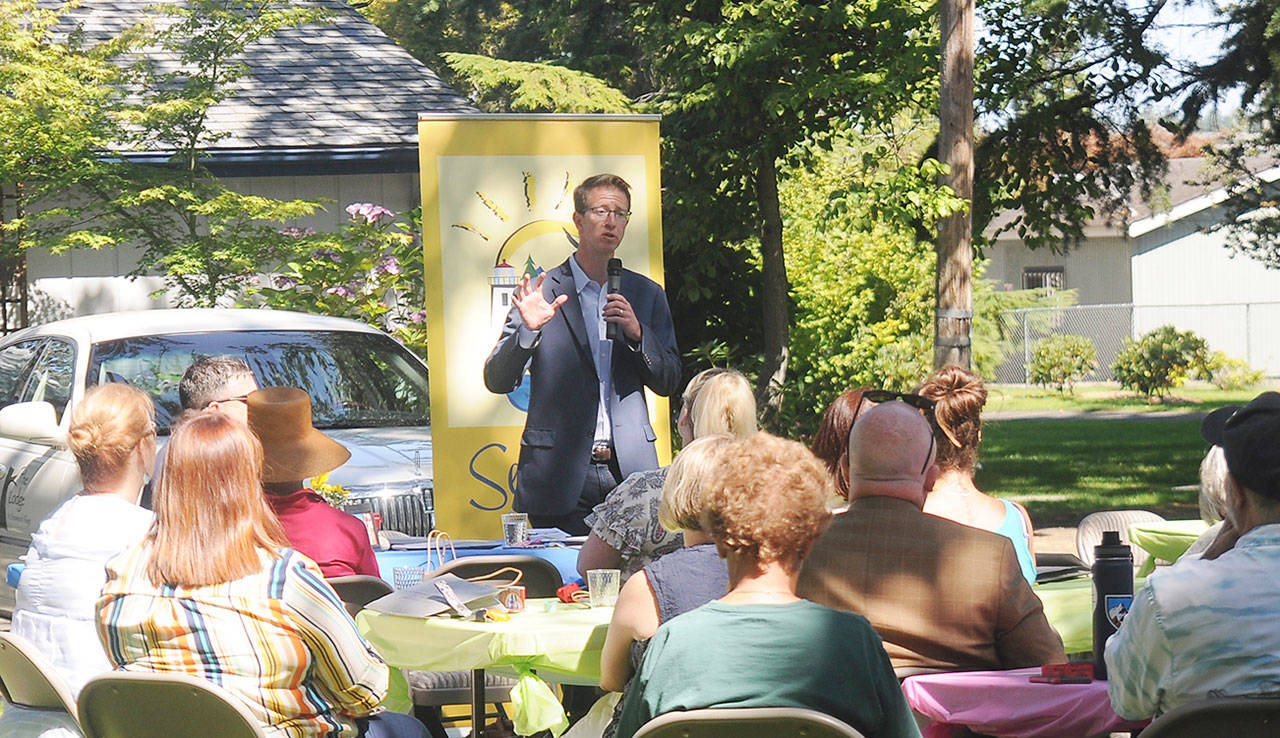While looking more toward solutions that spur economic growth than the partisan infighting in Washington D.C., U.S. Rep. Derek Kilmer brought a sense of levity on a visit to Sequim-Dungeness Valley Chamber of Commerce’s annual picnic in the park on Aug. 27.
“I was asked to give a 20-minute update on what’s happening in congress; I’m reticent to do that because you’re eating,” Kilmer joked at the luncheon, held at Pioneer Memorial Park.
Kilmer, D-Gig Harbor, represents the 6th Congressional District, which includes the North Olympic Peninsula.
“There are two or three things that keep me up at night. The first is we’re in the midst of massive, disruptive economic change,” he said.
“The benefits and pain (of those changes) is not felt in the same ways in the same places,” Kilmer said, citing a study by the Economic Innovation Group that found since 2011 more than half of the new business start-ups are created in the 20 percent of most flourishing communities, while the 20 percent least-flourishing communities have gotten worse.
“In a lot of communities I represent … we’ve got a jobs problem. That absolutely drives the work I do.”
In response, Kilmer said, legislators are looking at a number of bills to help people get training or retraining. He said he supports legislation to help school districts better fund vocational programs and for students to get better access to financial aid.
Kilmer also said he’s hopeful for legislation that would help people get retrained or get more education when their industry changes and their jobs becomes less relevant or obsolete.
“The days of starting a job and staying at that job for fifty years are increasingly over,” he said. “I think one of the roles of government is to help people negotiate economic change rather than be victims of it.”
Kilmer also touted the idea of increasing broadband internet access for rural communities.
“I wish I could tell you there’s a silver bullet (for boosting jobs); that’s just not true,” he said. “It’s more like silver buckshot. It’s a lot of things.”
In response to an audience question Kilmer also railed against a decision by the Centers for Medicare and Medicaid Services (CMS) to cut Medicare and Medicaid reimbursements for medical facilities not located near community hospitals.
The decision would hit Olympic Medical Center, which has facilities in Port Angeles and Sequim, to the tune of $47 million over the next decade, he said.
That move sparked a lawsuit American Hospital Association and Association of American Medical Colleges, in which OMC is a plaintiff.
“It’s is a completely tone-deaf to have a policy like that in a rural area,” Kilmer said, and noted that he joined a bipartisan bill to halt CMS’s decision, known as “site neutrality,” to help protect medical centers in rural communities.
“Unfortunately the law is being ignored,” Kilmer said. “OMC is pursing litigation. We’re pursuing legislation.”



